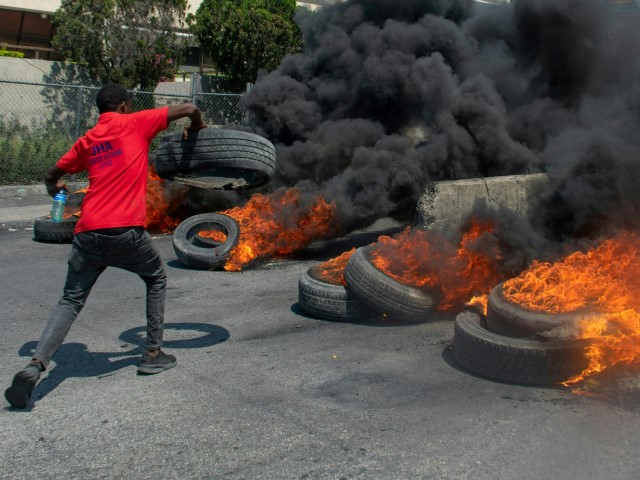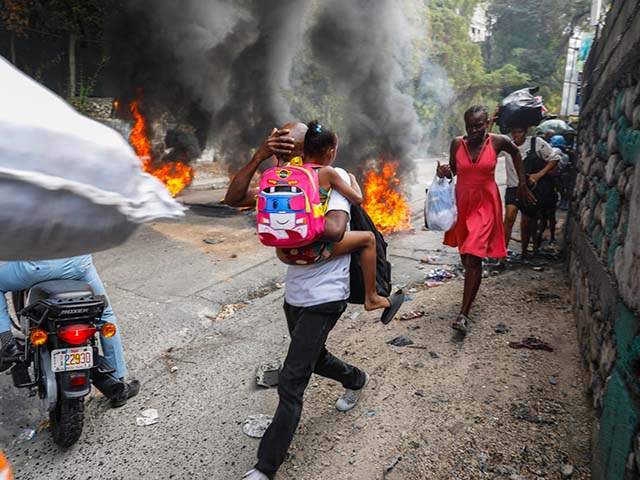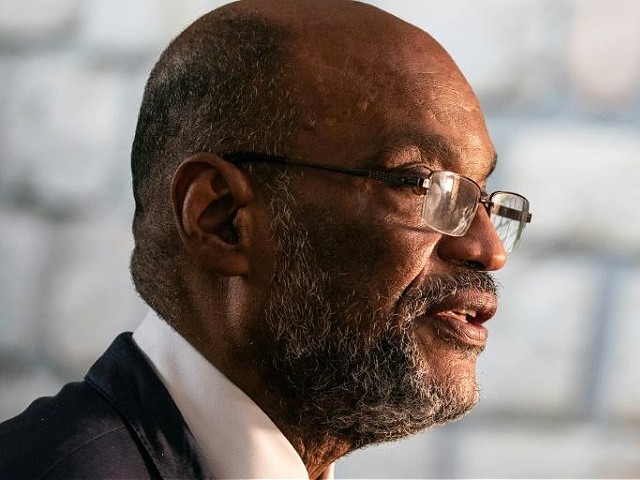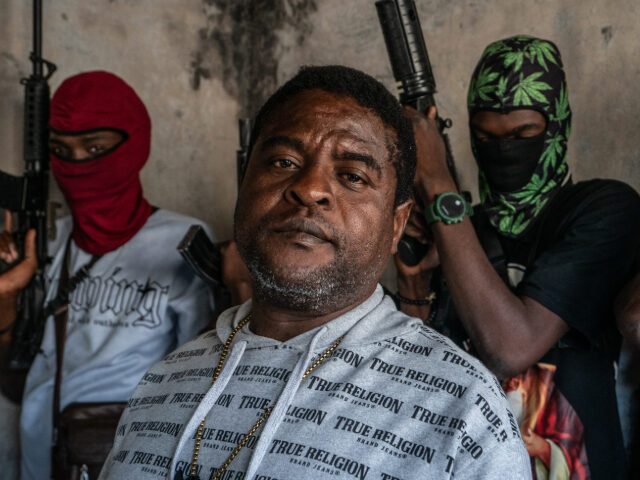Haitian gang leader Jimmy “Barbecue” Cherizier reportedly ordered his men to “burn every house you find” as a wave of vicious gang attacks swept across Port-au-Prince, apparently in a bid to intimidate the recently announced “transitional council” from meeting to appoint a new government.
Reporters described part of Port-au-Prince as a “battlefield between police and armed gangs” on Sunday, while residents said dozens of homes and businesses were set ablaze. Violence spilled into the suburbs of the capital city. Gang members ransacked the medical center of the State University of Haiti, one of the country’s most prestigious schools.
Two audio messages, purportedly from top gang leader Jimmy “Barbecue” Cherizier, were posted on social media. In the messages, Cherizier told his men to set as many fires as possible in the impoverished Port-au-Prince district of Lower Delmas.
“Continue burning the houses. Make everybody leave … No need to know which house. Burn every house you find. Set the fire,” the messages said. In one of the recordings, the man claiming to be Cherizier said he would provide cans of gasoline to fuel the arson spree.

A protester burns tires during a demonstration in Port-au-Prince, Haiti, on March 12, 2024, following the resignation of Haitian Prime Minister Ariel Henry. (CLARENS SIFFROY/AFP via Getty)
The U.N. reported on Friday that violence in Haiti intensified by more than 50 percent in the first quarter of 2024, with more organized gang attacks on government and law enforcement facilities, such as the prisons emptied by gang attacks. At least 22 police facilities were looted and set on fire by the end of March, and 19 police officers were killed.
The U.N. said Haiti’s gangs are committing almost every human rights violation on the books, from using rape as a weapon to recruiting child soldiers. Kidnapping for ransom declined slightly, although it is still a common crime, as the gangs shifted their focus to creating as much mayhem and carnage as possible.
Vigilante killings by angry and desperate civilians are also on the rise. The Associated Press (AP) interviewed a group of Port-au-Prince residents on Sunday who were trying to scrounge up enough money to build a metal barricade around their community to keep out both hoodlums and marauding vigilante gangs.
One resident described the entire city as an “open-air prison” and spoke of sleeping with his family on the roof of their house, hoping raiders would not notice them while they ransacked the empty home. Many people have turned to black market sales of gasoline, food, and water to survive, running for their lives with their carts full of merchandise when gangs descend upon them.

People walk past burning tires during a protest against Haitian Prime Minister Ariel Henry in Port-au-Prince, Haiti, on February 5, 2024. (AP Photo/Odelyn Joseph)
Gang violence spiked after the gangs were able to prevent Prime Minister Ariel Henry from returning to the country after a trip to Kenya at the end of February. Henry, who took power after the assassination of President Jovenel Moïse in July 2021 and has never stood for election, agreed to resign after he was forced into exile in Puerto Rico. However, he has not yet resigned, as he said he would only do so once the “transitional council” established itself.
The gangs ostensibly united into a rebel coalition called “Viv Ansanm” — or “Living Together” — with the goal of forcing Henry out of office, and leaders like Cherizier have styled themselves as civic activists seeking to overthrow a corrupt regime for the good of the people. But the gangs only became more violent and destructive after Henry seemingly surrendered and agreed to resign. Many prospective members of the transitional council have been subjected to death threats.
After months of intensive negotiations and terror in the streets, the membership of the transitional council was finally announced on April 16. It includes seven voting members and two non-voting observers.
The U.N. enthusiastically applauded the creation of the council, and the Biden administration immediately showered Haiti with $60 million in funding for a “multinational security support mission” that does not exist, but the first council meeting has not been scheduled yet. Some skeptical observers, and even some members of the council themselves, fear that Henry will undermine the transition process so he can stay in power, or the gangs will use terror tactics to prevent the council from meeting.

Haitian Prime Minister Ariel Henry (VALERIE BAERISWYL/AFP via Getty Images)
Immigration groups on Friday blasted the Biden administration for deporting about 50 Haitian illegal aliens back to the “deadly crisis” they fled.
“This deportation shows how disrespectful the Administration is towards Haitian migrants,” said Nattacha Wyllie of the Haitian American Art Network.
Florida Immigrant Coalition executive director Tessa Petit said:
This deportation flight is another example of the hypocritical position of the Biden administration towards Haiti – granting Temporary Protected Status (TPS) on the basis that deporting people to a country gripped by violence and unrest is inhumane – to only authorize deportations at the most violent time in the history of Haiti.
The Department of Homeland Security (DHS) insisted U.S. policy to “return noncitizens who do not establish a legal basis to remain in the United States” will continue — a signal the administration is wary of the enormous, and probably very dangerous, migration wave that might ensue if Haitians believe they can automatically secure asylum upon reaching American soil.
The U.S. Coast Guard has been trying to intercept Haitian migrants at sea and send them home, while the federal government reportedly has a contingency plan to divert Haitians to a refugee facility at Guantánamo Bay in Cuba. However, some officials say that that plan would be overwhelmed if Guantánamo had to process more than a thousand refugees a day.
The International Organization for Migration (IOM) has warned that Haiti is facing a “crisis” of internally displaced persons (IDP), with some 360,000 people currently displaced within Haiti’s borders, 160,000 of them from Port-au-Prince alone.

COMMENTS
Please let us know if you're having issues with commenting.